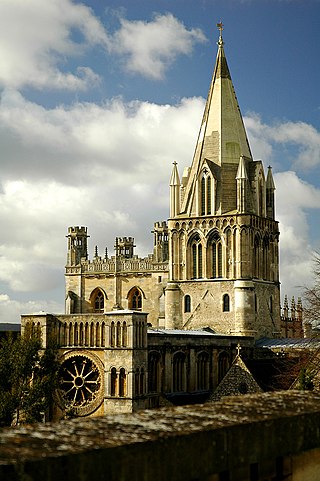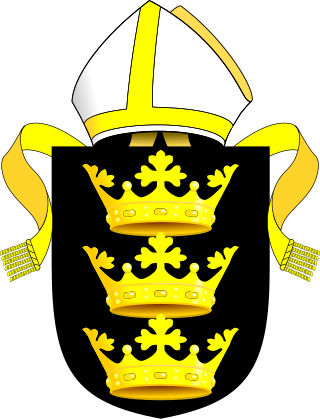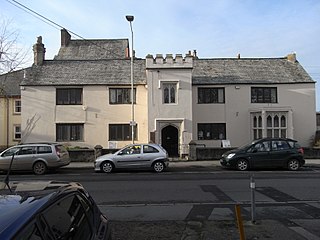
Barnstaple is a river-port town and civil parish in the North Devon district of Devon, England. The town lies at the River Taw's lowest crossing point before the Bristol Channel. From the 14th century, it was licensed to export wool from which it earned great wealth. Later it imported Irish wool, but its harbour silted up and other trades developed such as shipbuilding, foundries and sawmills. A Victorian market building survives, with a high glass and timber roof on iron columns.

The Diocese of Southwark is one of the 42 dioceses of the Church of England, part of the worldwide Anglican Communion. The diocese forms part of the Province of Canterbury in England. It was created on 1 May 1905 from part of the ancient Diocese of Rochester that was served by a suffragan bishop of Southwark (1891–1905). Before 1877 most of the area was part of the Diocese of Winchester, some being part of the Diocese of London.

The Diocese of St Albans forms part of the Province of Canterbury in England and is part of the wider Church of England, in turn part of the worldwide Anglican Communion.

The Diocese of Oxford is a Church of England diocese that forms part of the Province of Canterbury. The diocese is led by the Bishop of Oxford, and the bishop's seat is at Christ Church Cathedral, Oxford. It contains more church buildings than any other diocese and has more paid clergy than any other except London.

The Diocese of Bristol is an ecclesiastical jurisdiction or diocese of the Church of England in the Province of Canterbury, England. It is based in the city of Bristol and covers South Gloucestershire and parts of north Wiltshire, as far east as Swindon. The diocese is headed by the Bishop of Bristol and the Episcopal seat is located at the Cathedral Church of the Holy and Undivided Trinity, commonly known as Bristol Cathedral.

The Diocese of Exeter is a Church of England diocese covering the county of Devon. It is one of the largest dioceses in England. The Cathedral Church of St Peter in Exeter is the seat of the diocesan Bishop of Exeter. It is part of the Province of Canterbury. The diocesan bishop is assisted by two suffragan bishops, the Bishop of Crediton and the Bishop of Plymouth. The See of Crediton was created in 1897 and the See of Plymouth in 1923.

The Anglican ministry is both the leadership and agency of Christian service in the Anglican Communion. Ministry commonly refers to the office of ordained clergy: the threefold order of bishops, priests and deacons. More accurately, Anglican ministry includes many laypeople who devote themselves to the ministry of the church, either individually or in lower/assisting offices such as lector, acolyte, sub-deacon, Eucharistic minister, cantor, musicians, parish secretary or assistant, warden, vestry member, etc. Ultimately, all baptized members of the church are considered to partake in the ministry of the Body of Christ.
The Deanery of Hartland represents the Church of England in the north west corner of Devon within the Archdeaconry of Barnstaple and the Diocese of Exeter.
The Deanery of Cadbury represents the Church of England in mid Devon, within the Archdeaconry of Exeter and the Diocese of Exeter. The current rural dean is Matthew Tregenza.
The Deanery of Christianity is a deanery in the Archdeaconry of Exeter, Diocese of Exeter. The deanery covers most of the city of Exeter. It takes the name "Christianity" because there is a tradition that a diocese and a deanery should not share the same name.
The Deanery of Reading lies within the Church of England Archdeaconry of Berkshire in the Diocese of Oxford. As of 2007, there were reported to be 3,428 members of churches within the deanery.

The Priory of St Mary Magdalene in Barnstaple was a priory in Devon, England. It was founded in about 1107 by Juhel de Totnes, feudal baron of Barnstaple, who had earlier founded Totnes Priory in about 1087 at the caput of his former feudal barony of Totnes, from which he had been expelled. Barnstaple Priory was of the Cluniac order. It was dedicated to St Mary Magdalene. It was situated on land outside the town walls stretching from the North Gate to the East Gate with the River Yeo forming its northern boundary. Nearby to the north across the River Yeo was the Benedictine Pilton Priory of St Mary the Virgin, a cell of Malmesbury Abbey, founded slightly later, between 1107 and 1199.
Algernon Giles Seymour was an Anglican priest in the first part of the 20th century.

Rev. Martin Blake (1593-1673) was vicar of Barnstaple in Devon, 1628–56; 1660–73, and suffered much for his adherence to the Royalist cause during the Civil War, as related in John Walker's Sufferings of the Clergy (1714). According to Chanter (1882) "The eventful history of the Rev. Martin Blake has been often written in public history and local annals".









